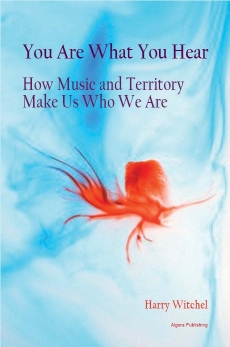
The first radio interview on my new book on music was broadcast on BBC World Service on January 13 in the final 10 minutes of their culture show called "The Strand". The interviewer is world music aficionado Mark Coles.
Listen...
2.4 MB mp3 File (6 minutes).

This is an interview with me about noisy students causing a neighbour to move house because they played music late into the night. The concepts of territory come into play. The interviewer is Suzanne Bamborough.
Listen...
2.3 MB mp3 File (5 minutes).

Sunday 23 January 2011
Len Phelan
Why we evolved to create music and what is its effect upon us are two fascinating questions which this book sets out to answer.
Written by physiologist Harry Witchell it draws on recent scientific research and a mine of occasionally amusing anecdotes to buttress his central thesis that like birds and primates we use music to delineate and reinforce social territory.
According to Witchel that territory is a state of mind rather than a physical space and the book goes on to explore how this occurs and what its consequences might be.
En route, Witchel throws up some intriguing answers as to why some prefer rap to Beethoven or whether listening to Mozart actually sharpens the intelligence.
Mixed in with some pretty esoteric stuff, there's enough here to amuse to keep the general reader entertained.
But there's no doubting Witchel's serious intent and his exploration of how music benefits those on the autistic spectrum provides valuable insights into the therapeutic value it can bring.

Spring 2011
Thelma Lovick - University of Birmingham
Music is organised sound, created to elicit responses in the listeners. So why is music so different from noise or even talking? Harry Witchel’s thesis is that humans have music to establish and reinforce social territory.
By the author’s own admission, there are not as much controlled experimental data to support the hypothesis as one would normally like to see, as an academic. However, Harry Witchel has read widely. He provides examples ranging from the behaviour of songbirds and the Third Reich to modern day shopkeepers, to illustrate how music is used to manipulate the behaviour of populations.
The 11 chapters each pose a question related to a different aspect of music. Why does music make sex better? Can music cure? Does violent music lead to violent behaviour?
Although packed full of interesting facts and anecdotes related to music, the thesis of music and territory does seem to get overlooked. In Chapter 9, for example, on whether music makes the brain grow larger, there is an intriguing story about the fate of Haydn’s brain, which relates how, after being removed from his coffin by bodysnatching phrenologists, his skull passed through the circles of Viennese society for the next 145 years before finally being reunited with the rest of his body. There’s another fascinating story about the fate of Einstein’s brain. The mathematical genius was also an accomplished violinist.
The book aims to be accessible to a wide audience. It is an easy read and source material, together with explanations of technical procedures, like fMRI, are referenced at the bottom of each page. I quite like this format because it is interesting to know where all the diverse and obscure facts were gleaned from, without having to keep turning to a bibliography at the end.
I read this book by dipping into it a chapter at a time, sometimes accompanied by music but often in silence in my ‘safe’ home territory.
I also read it on trains and buses to the accompaniment of noise. Did the music make any difference? I tried Chapter 1 to the Eagles and then a Malian band called Tamikrest. I tried some later chapters with Vivaldi or a bit of Mozart. I don’t think any of them made a difference. Did I feel safer or more territorial with the music on? Not really. But I did quite enjoy reading the book.

Dr. Daniel Mullensiefen
Scientist in Residence, DDB UK
Senior Lecturer in Psychology, Goldsmiths' College
Dr. Mullensiefen has a blog aimed at the Marketing/Advertising community. The following is an extract from his blog (the full entry can be found here):
Music might be one of the best vehicles for capitalising on priming effects in advertising. Our memory for tunes almost seems to be unlimited, both in terms of the number of tunes we can remember, as well as for how many years we can remember them. Music can very effectively trigger emotional reactions, it is universally understood and appreciated, and it gets very easily associated with specific people, places, or situations. Thus, if we want to capitalise on psychological priming effects in advertising then music might be a very good place to start.
Of course, other clever people have made that connection between music priming and advertising as well. In fact, I went to a book launch in Brighton yesterday where Harry Witchel, Discipline Leader in Physiology at Sussex Medical School, presented his latest book on the effects of music on the mind ('You Are What You Hear', Algora Publishing, 2010).
The book contains a chapter 'Can music surreptitiously influence what we decide to buy in shops?' where Witchel in his very witty style assembles evidence showing that music actually changes people's behaviour. He cites the famous supermarket study where French or German music on a wine aisle made people buy more French or German wine – the latter is an achievement in itself – even though most people weren't aware of the fact that there was any music by the time they had passed the checkout. And he cites evidence that people have always believed strongly in the power of music to change human behaviour, especially when it is most needed and everything else has failed, like the not very well-known 'S-project' story.
'S-project' was a plan hatched by the Roosevelt administration which involved sending records with Wagner's music and peace messages to Hitler and other Nazi-leaders in 1944. The pianist playing on the records was Ernst Hanfstaengl, one Hitler's confidants from his early days in Munich, who, on several occasions, was able to trigger very emotional reactions in Hitler with his piano playing. Maybe Wagner's music played by Hitler's favourite performer in combination with spoken peace messages could touch the dictator's feelings and change his behaviour?
It was not a controlled experiment and we don't know what the world would be like if those records would have actually been delivered to their addressees but – just how much should we trust in the powers of music?
1 February 2011
|

